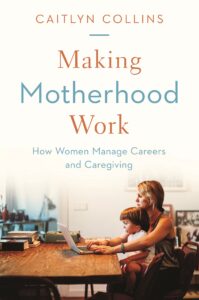Of all Western industrialized countries, the United States ranks last for supportive work-family policies. It has the highest gender wage gap. Moreover, there is no federal paid parental leave and no minimum standard for vacation and sick days. Can American women look to European policies for solutions?
Yes, answers Caitlyn Collins, who parlayed her research on work-family conflict into a book, “Making Motherhood Work: How Women Manage Careers and Caregiving.”

“I wrote this book because mothers in the U.S are drowning in stress,” said Collins, assistant professor of sociology in Arts & Sciences at Washington University. “Seventy percent of these mothers work outside the home; yet, they are still responsible for most of the housework and childcare.
For her book, Collins interviewed 135 middle-class working mothers in Sweden, Germany, Italy, and the United States over a period of five years. Her research took her into the kitchens, living rooms, parks, cafés, office cubicles, and conference rooms—places where working mothers went about their day-to-day lives.
Policies alone, Collins discovered, cannot solve women’s struggles. Her comparative study showed that what mothers want and expect regarding work and family depends on their social context, as do the solutions they employ to alleviate their stress.
“With women held to unrealistic standards in all four countries, the best solutions demand that we redefine motherhood, work, and family,” Collins said.
The need for effective work-family policies “transcends social class and race and is bigger than region and religion,” Collins said. “It cannot be resolved by individual efforts and balance.”
Collins added that “work-family conflict is not an unfortunate and inevitable part of life in this century. It is a phenomenon that societies have created, which means that society can change it, too.”
There is a way forward, Collins noted. “Mothers’ tribulations are central to this book, but this is not a chronicle of their despair. Their stories call us to action.”
Department of Sociology boosts research at heart of national, global challenges
As a young and growing department at Washington University, sociology strives to understand the origins and reproduction of social inequality and apply that knowledge to address issues of great public concern. Both faculty and students approach their work with rigorous empirical research to identify and suggest solutions to social problems.
Unique to the department’s rebirth in 2015, was the opportunity to reinvest in and create, from the ground up, new programs that would address pressing issues facing individuals and communities around the globe.
Washington University had, in fact, a top-flight sociology department that grew in size and prestige throughout the 20th century. The first sociology class at the university was taught in 1906 by Roger Nash Baldwin, who later established the American Civil Liberties Union.
The department, however, was disbanded in 1991; it began anew as a dynamic, interdisciplinary department nearly 25 years later. A cadre of well-established faculty helped launch the department, branding it with distinction early on. Today, sociology operates in the vanguard of programs directed to effecting positive social change while also addressing St. Louis roots and history.
We invite you to explore faculty research programs, the attention their work has garnered in media and policy circles, the many dynamic courses available, and the focus of the department’s recently inaugurated graduate program.
